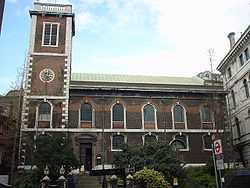St Andrew-by-the-Wardrobe
| St. Andrew-by-the-Wardrobe | |
|---|---|
|
Exterior photo of St. Andrew-by-the-Wardrobe | |
| Country | England |
| Denomination | Church of England |
| Architecture | |
| Architect(s) | Sir Christopher Wren |
| Style | Baroque |
| Administration | |
| Diocese | London |
St. Andrew-by-the-Wardrobe[1] is a Church of England church located on Queen Victoria Street, London in the City of London, near Blackfriars station.
History
First mentioned around 1170,[2] St. Andrew-by-the-Wardrobe was almost certainly founded considerably earlier. During the 13th century the church was a part of Baynard's Castle, an ancient royal residence. In 1361, Edward III moved his Royal Wardrobe (a storehouse for Royal accoutrements, housing arms and clothing among other personal items of the Crown) from the Tower of London to just north of the church. It was from this association that the church acquired its unique name.
The Wardrobe and the church, however, were both lost in the Great Fire of London in 1666.[3] Of the 51 churches designed by Sir Christopher Wren after the Great Fire, St. Andrew-by-the-Wardrobe is among the simplest of his designs; it was rebuilt in 1695.
The church was again destroyed during the London blitz by German bombing; only the tower and walls survived. It was rebuilt and rededicated in 1961.
Advowson
The advowson of St Andrew's was anciently held by the family of FitzWalter to which it probably came from the holding by Robert Fitzwalter(d.1235) of the office of Constable of Baynard's Castle.[4] In 1417 it was held by Thomas de Berkeley, 5th Baron Berkeley(d.1417), as his charter dated 24 June 1417 appointing feoffees to his estate records.[5] Berkeley's Inn, the town house of that family stood nearby, at the south end of Adle Street, against Puddle Wharf, as reported by John Stow in his "Survey of London"(1598)[6]
Building

St. Andrew's is situated on a terrace overlooking the street, its plain red-brick exterior contrasting with the stone buildings on either side. The interior is aisled, with arcaded bays supported by piers rather than the usual columns.[7] The original interior fittings were mostly destroyed during the war, and many of the church's features were procured from other destroyed London churches. The weathervane on the steeple comes from St Michael Bassishaw (which was demolished in 1900). A replacement pulpit came from the church of St Matthew, Friday Street.[8] The font and cover also came from here. There is a figure of St Andrew, dated around 1600, which stands on the north side of the sanctuary and an unusual figure of Saint Anne who is shown holding the Virgin Mary who in turn holds the Christ child. This statue, which is probably north Italian, dates to around 1500.
William Shakespeare was a member of this parish for about fifteen years while he was working at the Blackfriars Theatre nearby, and later he bought a house within the parish, in Ireland Yard. In his honour, a memorial was erected in the church.[9]
Regular Sunday services are conducted there by the St. Gregorios congregation of the Indian Orthodox Church.[10]
The church was designated a Grade I listed building on 4 January 1950.[11]
See also

- List of churches and cathedrals of London
- List of Christopher Wren churches in London
Notes
- ↑ Prior to the King's wardrobe moving to the adjacent area it was known as St Andrew by Castle Baynard- "The Churches of the City of London" Reynolds H.: London, Bodley Head, 1922
- ↑ "London:the City Churches Pevsner,N/Bradley,S : New Haven, Yale, 1998 ISBN 0-300-09655-0
- ↑ "The Old Churches of London" Cobb,G: London, Batsford, 1942
- ↑ Thornbury, Walter. Old & New London, Vol.1, pp.302-3
- ↑ Jeayes Charters, no.581
- ↑ Quoted in Thornbury, op.cit
- ↑ "The City of London Churches" Betjeman,J Andover, Pikin, 1967 ISBN 0-85372-112-2
- ↑ "The London Encyclopaedia" Hibbert,C;Weinreb,D;Keay,J: London, Pan Macmillan, 1983 (rev 1993,2008) ISBN 978-1-4050-4924-5
- ↑ The Visitors Guide to the City of London Churches" Tucker,T: London, Friends of the City Churches, 2006 ISBN 0-9553945-0-3
- ↑ Church website accessed 29 October 2009
- ↑ Historic England. "Details from image database (199712 )". Images of England. accessed 23 January 2009
External links
| Wikimedia Commons has media related to St Andrew-by-the-Wardrobe. |
Coordinates: 51°30′44.44″N 0°6′4.89″W / 51.5123444°N 0.1013583°W
